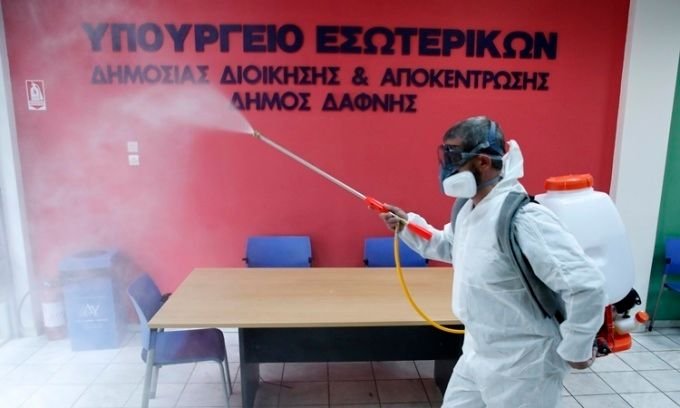
Greece – a rare bright spot amid Covid-19 in Europe
Greece is considered one of the most problematic members of the European Union (EU) because of the financial crisis, corruption and political instability.
Staff in protective clothing spray disinfectant at a reception room in the suburb of Dafni, east of Athens, Greece, March 9.
When nCoV spread across Europe, many Greeks feared that they would become the second Italy or Spain.
Now, the country that was considered the `spoiled child` of the EU is celebrating the government’s response to Covid-19 and looking forward to reopening the economy.
`Greece has acted beyond all expectations,` commented Kevin Featherstone, director of the Hellenic Observatory research center at the London School of Economics, UK.
Because Greece has only tested a small portion of the population, it is impossible to be certain about how widespread the virus is in the country.
On April 28, more than a month after the government imposed a blockade, Greek Prime Minister Kyriakos Mitsotakis announced a plan to relax restrictive measures to gradually bring the country back to normal operations.
To date, only nearly 70,000 people have been tested for nCoV in Greece, but experts agree that the government’s swift imposition of community quarantine and strengthening of the country’s already ailing health system have helped prevent
On February 27, less than 24 hours after Greece recorded its first case of nCoV infection in Thessaloniki, the country’s second largest city, the government immediately canceled an annual street festival.
Anyone returning from abroad must undergo a mandatory two-week quarantine or face a $5,400 fine.
Currently, Greece records nearly 2,600 cases of nCoV infection.
Medical staff disinfect the body bag of a patient infected with nCoV at a hospital in Athens.
Starting in February, Greece has worked to increase the number of intensive care (ICU) beds by up to 70% and add 3,337 medical staff in hospitals, Health Minister Vassilis Kikilias said.
`The reaction speed is very fast,` said Anastasia Kotanidou, associate professor of the Department of Intensive Care at the University of Athens and president of the Greek Intensive Care Association.
Across the country, many Greeks quickly accepted the new normal, even canceling gathering in groups to roast lamb on the occasion of Orthodox Easter.
A recent survey shows that the two most important figures in Greece today are Sotiris Tsiodras, an infectious disease expert at the University of Athens, and Nicholas Hardalias, deputy minister of Civil Protection.
According to Featherstone, the Greek government is `calculating scientifically` by letting Dr. Tsiodras lead policy and giving Deputy Minister Hardalias the authority to oversee the country’s response to the epidemic, helping everything run smoothly.
Pavlos Eleftheriadis, a retired stage director at the national theater in northern Greece, said he was surprised to see the government’s response to the epidemic.
`I feel proud that we have an effective state, with politicians who listen to scientists,` he said.
However, the Greek government still faces some criticism.
There have been outbreaks in Greek refugee camps and despite calls for evacuation, some refugees have been allowed out into the community.
At least 150 people at a hotel used to house refugees tested positive for nCoV this month.
Many others expressed concern over reports of police abuse of power while enforcing lockdown measures, including excessive use of force.
Fani Kountouri, associate professor of political science and political communication at Panteion University in Athens, assesses that the current sentiment of satisfaction with the government could easily disappear, depending on how the country copes with the crisis.
Tourism, which accounts for 18% of Greek GDP, is expected to be the sector hardest hit.
On April 28, Prime Minister Mitsotakis announced that from May 4, bookstores, hair salons and some other stores will reopen.
Churches will reopen but will only hold private services.
Many Greeks feel proud because their country is emerging as a rare success story in the EU amid the Covid-19 pandemic.
Costas Thi Oudis, a 50-year-old taxi driver in Thessaloniki, said he did not blindly support the government but was satisfied with the way authorities responded.
`The Greek government took countermeasures earlier than most of the rest of Europe,` he said.
`Some Europeans don’t take us seriously,` said Costas Hatzopoulos, 54, an agronomist in Thessaloniki.
Vu Hoang (According to NYTimes)


